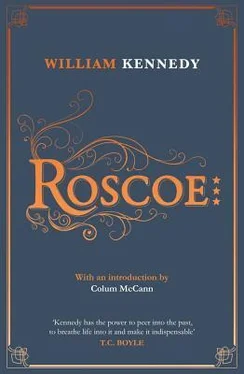“You shouldn’t be so needy.”
“You don’t know about need, Veronica. ”
“Oh, don’t I?”
“. or the charm of trash.”
“Elisha was amused by trash.”
“Really? I never noticed that in him.”
“Of course you didn’t, you two trash collectors.”
“Did you swim yet this morning?” he asked.
“Not yet. Do you want to swim? You have trunks in the pool house.”
“Do you want to swim? That’s the question.”
“We’re in this deep water together now, aren’t we?”
She stood and took off her sundress. Contoured sublimely by her clinging tank suit, solid black for mourning under water, she walked to the pool’s edge and dove in, Olympically. Roscoe watched her swim, then walked to the pool house, shed his clothing, and pulled on his bathing trunks, the snake’s new skin. Slithy Roscoe: protector of widow and child, surrogate husband without privilege, barrister and sleuth for hire, quester for buried love and answers to vexing secrets, what a useful tub-of-guts you’ve become. He blinked as he stepped into the sunlight, exposing his Homeric girth to her inspection.
“Are you prepared to gaze upon this pale orb of corpulence?” he asked.
“You seem to be getting thin,” she said, treading water.
“Your lies are like candied kumquats,” he said. “But neither largeness nor love can be hid.” He bounced twice on the diving board, then cut the water with a graceful arc, pleased with his boldness, and saying in midair, “We must all to the wars — again,” and with pain stabbing him in some unidentified internal organ, he sank beneath a great wave of his own making.
A Fitzgibbon kitchen maid brought to poolside the iced tea and crustless ham and chicken sandwiches Veronica had requested. On the tray with the food was the Albany Sentinel, which had arrived by courier with a cover note from Gladys Meehan: “Dear Veronica, This came into the office this morning with the other newspapers, and I thought you should see it as soon as possible. If there’s anything I can do, please call.”
Roscoe unfolded the paper, which was open to the page with the “Ghost Rider,” a gossip column, and he and Veronica read together the item Gladys had outlined in red pencil:
COURTROOM DRAMA!The Mayor’s kid brother, Gilby Fitzgibbon, may only be his cousin! Mayor’s mother, Veronica Fitzgibbon, is being sued by her socialite sister, Pamela Morgan Yusupov, for custody of Gilby, who, she sez, is her boy. Coming atop of sudden death of hubby Elisha Fitzgibbon, this is doubly troubly for Mrs. Fitz. Fitzgibbon death also a big loss for local Dems. Remember Mayor Goddard dying strangely in Havana in 1928?. Speaking of grave matters, Ghost Rider hears a recent sudden death from natural causes looks like suicide!
“How did they get that?” Veronica asked.
“Her lawyer had to file the petition with the county clerk, and some reporter found it, or was tipped off. Nasty but legal.”
“You think they’re talking about Elisha’s suicide?”
“I think I’ll visit the Sentinel and inquire.”
He wrapped two chicken sandwiches in a napkin and ate them on the drive to the Sentinel. The gossip boiled his juices, and by the time he reached Newspaper Row at Green and Beaver Streets he was shaping the curses he’d heap upon Roy Flinn, the publisher. The Flinns were cascading back into Roscoe’s life: first Arlene, then dead Artie, now Roy.
Roscoe climbed the stairs to the loft where the weekly Sentinel had been founded by Warren Skaggs, a printer, in 1909, and thrived in the era of Republican control of the city. Skaggs did city printing business for the Republicans and also started printing, then backing, the Albany baseball pool in 1920 as a neighborhood venture with a fifteen-dollar weekly prize. Popularity grew, prizes swelled to nine hundred dollars, then three thousand, and the pool’s take kept escalating.
Players, for a dollar a play, chose six numbers (from one to sixteen), one for each day of play: Monday to Saturday. As the week began, the pool published a key that matched a number with each of the sixteen big-league baseball teams. Pool players whose numbers matched the six teams that accumulated the greatest number of runs during the week won the prize. The game appealed not only to baseball fans but to every sucker who believed in the easy dollar, and Albany was blessed with many.
Patsy paid serious attention to the pool for the first time at Willie Altopeda’s funeral in 1924, when he saw Warren Skaggs, a Republican, driving a four-thousand-dollar Cadillac. “I knew the bum when he couldn’t afford a wheelbarrow,” Patsy said.
Artie Flinn, a quick-witted gambler from Arbor Hill who’d grown up with Patsy, enlightened him on how profitable Skaggs’s baseball pool was. Patsy then invited Skaggs and his partners to share pool profits with him fifty-fifty. Skaggs gnashed his teeth and said no. Patsy threatened to have the police close the pool and put Skaggs and company in jail, but said he’d accept a lesser cut if Artie Flinn became a pool associate.
Patsy, the pool’s new panjandrum, expanded its territory and sales force, and by 1926, when he took it away from Skaggs entirely, pool plays were selling all over New England and New Jersey, and grossing four million for the year, not enough. The next summer Artie and Patsy implemented a plan to plug the pool — put thousands of dummy plays into competition with the public play. Artie oversaw the plugging, hiring young women at twenty-five dollars a week to write books full of plug plays, more than a hundred books a week, each book with twenty plays. Artie, his cohort of pluggers, and twenty accountants manipulated and published thousands of plays and combinations, okaying payoffs for enough legitimate winners to keep word-of-mouth at a frenzied pitch.
In May 1927, the pool announced its first prize of twenty-two thousand dollars had been won by “Mutt,” second prize of sixteen thousand by “Joan,” and third prize of eleven thousand shared by “John Doe,” “Beautiful,” and “Marie,” all anonymous, and there were forty ties for the low prize of five thousand dollars. None of this bothered the public. Callers clogged newspaper switchboards for baseball results. Broadway, across from Union Station at four-thirty on Saturday afternoons, was impassable to traffic as Sport Schindler posted, in front of his speakeasy, inning-by-inning scores of major-league games crucial to pool prizes. By the end of the 1928 baseball season the pool’s gross for the year was five million; by 1929, seven million.
Warren Skaggs, a grumpy loser, kept his Sentinel running as a pesky hornet trying once a week to sting Democrats. That his paper survived at all was because of its racy cover age of divorces and scandals. Cautious readers carried it home under their coats. In 1929, it printed two dozen torchy love letters, all forgeries, from a 1908 Love Nest Scandal involving an Albany playwright and an actress, and when the playwright won a libel settlement against Skaggs, Patsy used this outrage as a reason to pressure advertisers to withdraw their ads. Skaggs had to close the paper.
In September 1930, a federal prosecutor moved against the pool for violation of the interstate-lottery law, indicting Artie and two dozen others, including Warren Skaggs, who testified with great relish about Patsy’s takeover and Artie’s plug system, and also brought Elisha’s name into it. Patsy was subpoenaed to appear before Artie’s grand jury but vanished and lived as a fugitive for three weeks before he figured out what to say. He surrendered to his attorney, Roscoe Conway, and came to federal court to testify.
Q:
Читать дальше












